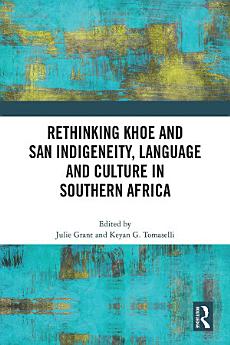Rethinking Khoe and San Indigeneity, Language and Culture in Southern Africa
About this ebook
This book brings together studies from a range of disciplines to examine what it means to be Indigenous Khoe and San in contemporary southern Africa. It considers the current constraints on Khoe and San identity, language and culture, constantly negotiating an indeterminate social positioning where they are treated as the inconvenient indigenous. Usually studied as original anthropos, but out of their time, this book shifts attention from the past to the present, and how the San have negotiated language, literacy and identity for coping in the period of modernity. It reveals that Afrikaans is indeed an African language, incubated not only by Cape Malay slaves working in the kitchens of the early Dutch settlers, but also by the Khoe and San who interacted with sailors from passing ships plying the West coast of southern Africa from the 14th century. The book re- examines the idea of literacy, its relationship to language, and how these shape identity.
The chapters in this book were originally published in the journal Critical Arts: South-North Cultural and Media Studies.
About the author
Julie Grant is senior research affiliate in the Department of Communication and Media at the University of Johannesburg. She has worked closely with the ‡Khomani San since 2005 spending an extensive amount of time living and working alongside the community; first as a researcher, then as the coordinator of the local community office, before returning to academia. Grant has written on San literacy and language, identity, tourism and land reform, mostly in relation to the ‡Khomani, although she has written to a lesser degree on the !xun and Khwe San.
Keyan G. Tomaselli is Distinguished Professor, Humanities Dean’s Office, University of Johannesburg. His other books on this topic include Cultural Tourism: Rethinking Indigeneity (2012), Writing in the San/d (2007), Where Global Contradictions are Sharpest (2005) and Encountering in the Kalahari (a Visual Anthropology special double issue, 1999, reprinted).







